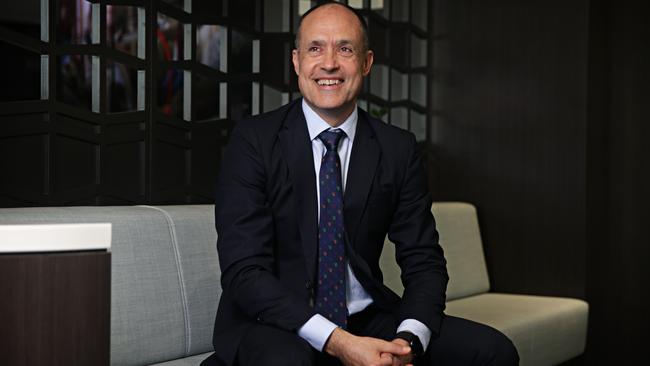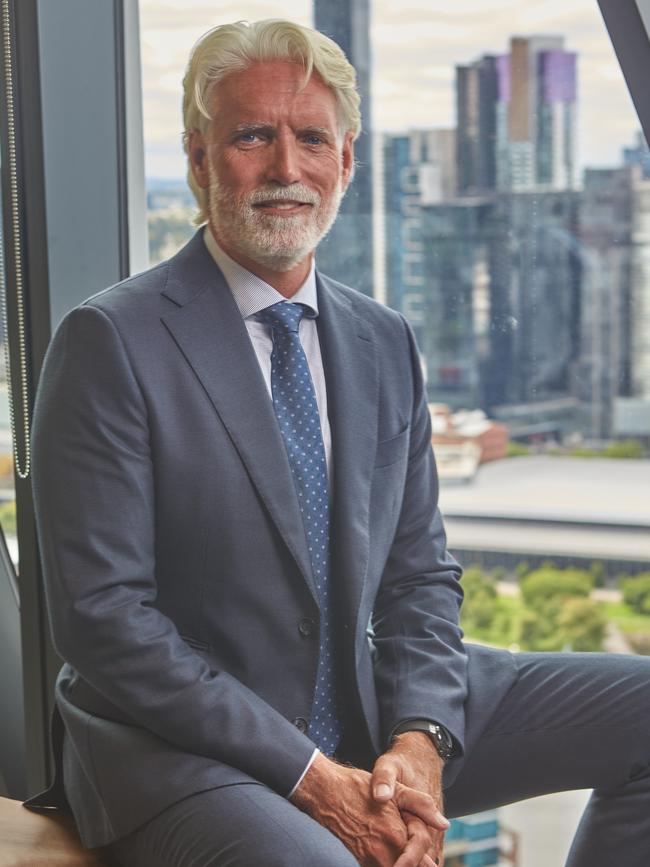ACCC wants the world ‘frozen in time’: TPG-Vodafone boss blasts regulator
TPG boss Inaki Berroeta says the competition regulator’s world view has become more about entrenching the status quo rather than delivering for customers.
Business
Don't miss out on the headlines from Business. Followed categories will be added to My News.
The nation’s third-largest telco wants a major overhaul to how competition policy operates in Australia, claiming its “1990s” view has become more about entrenching the status quo than delivering for customers.
Inaki Berroeta, who heads Vodafone-owner TPG, says the strict approach to competition is simply not working for people living outside big cities, and this serves to create a “regulated class system” – a duopoly or in some cases a monopoly where smaller players will forever be fighting for the scraps of the market. Berroeta is set to make the punchy comments in a speech to be delivered to the CommsDay summit in Sydney on Tuesday.

Not only is the mid-sized telco hitting out at competition rules, but the speech from the quietly forceful Berroeta comes at a critical moment.
The competition tribunal is about to start hearings this week that will determine whether Telstra and TPG can pool their mobile towers and spectrum resources in regional Australia.
However, there is an important distinction. His comments are aimed at the Australian Competition Consumer Commission that blocked the proposed tower deal and not the Australian Competition Tribunal that is set to determine the fate of the network sharing deal.
Berroeta argues the ACCC’s hardline approach to the Telstra and TPG mobile-sharing deal is an old-world way of looking at how infrastructure works. Australia’s vast size means a challenger mobile network built in the regions would be slow to roll out, incredibly costly and do little to shift the competitive dial.
Instead he says the real competition will be at the consumer end with TPG running its own pricing and data offerings across regional Australia under the deal. Savings from infrastructure building costs will be returned to customers.
“We must recognise the value of calling out entrenched thinking and regulatory resistance to new models and ways of working,” the TPG chief executive will say.
“The status quo is not enough to meet the needs of Australia. The status quo enables so-called competition to be served, only while there is an established and unopposed market structure – with a major player who serves the high end, another to take the middle, and a smaller player who fights for what’s left over,” he says in the speech.
Legal history
There is a bruising history between ACCC and TPG. Nearly five years ago the competition regulator opposed the $15bn merger between broadband player and then-established third mobile operator Vodafone. The ACCC argued that the then TPG boss David Teoh was planning to build out his own mobile network.

This ruling was later overturned through a landmark Federal Court battle spearheaded by TPG. It paved the way for the combination of the two and for Berroeta – then Vodafone Australia boss – to take charge of the bigger telco.
In December the ACCC blocked the attempted network sharing deal, accepting arguments from rival telco Optus that it would walk away from the regions if the Telstra-TPG deal went ahead given it would entrench Telstra’s dominant market share in regional Australia, which would hurt long-term competition. The regulator was also open to the idea of TPG and Optus forming their own alliance, something that TPG has publicly dismissed.
Both Telstra and TPG asked the competition tribunal to review the ACCC decision. The tribunal is scheduled to start its hearings on Thursday. It expected to deliver a decision before June 21.
Berroeta pointed to his telco’s track record: he says being a challenger is in the DNA of both the TPG and Vodafone. And this means always looking for ways to innovate and collaborate.
“A challenger seeks new ways to move the market, to overcome inherent regulatory bias and stale commercial practices and ideals,” he says.
And he says a regulatory mindset formed by the three-decade-old hangover of regulatory and policy failure simply hasn’t worked for regional Australians.
Now there needs to be a serious conversation about doing things differently.
“We build where it makes commercial sense, and we explore new ways to expand the reach and capability of our services.”
Overlapping networks are not only wasteful, but divert investment from other areas of need.
Progress is slow and it has proven to offer only minimal resilience during natural disasters such as floods or bushfires, he says, adding that the next wave of satellite or wave technology could make the heavy infrastructure obsolete.
“Competition doesn’t exist to dictate how the industry allocates capital or to pick winners and losers. At its core, competition exists to serve one simple, yet powerful purpose: to benefit customers,” Berroeta says in the speech.
Telstra boss Vicky Brady and ACCC commissioner Anna Brakey are both scheduled to address the conference on Tuesday.
Transurban shift
As the bearded Texan Scott Charlton prepares to hand over his Transurban empire to a yet-to-be-named chief executive later this year, the tolling major is about to reach its own fork in the road.
Nearly a decade of frenzied mega-road construction across Australia’s three east coast states is gradually coming to a conclusion, and this means Transurban will shift from being a growth company to an infrastructure manager.
Without the steady pipeline of big greenfield projects, Transurban’s business model will need to evolve as it carves out growth from expanding its existing toll road assets. Acquisitions of projects underway or established roads will represent the real driver of additional value.
So too is the internal succession race evolving Transurban. After the surprise retirement of WestConnex boss Andrew Head who plans to step down in several months, the focus is now on former investment banker and one time ANZ chief financial officer Michelle Jablko to step into the top job. She was thrown into the leadership stakes at ANZ under Shayne Elliott but joined Transurban as chief financial officer two years ago with an eye to be part of the succession planning process. Other internal candidates include partnership and risk boss Hugh Wehby.

While the Craig Drummond-led Transurban board is also considering outsiders (Charlton took the job from Lendlease when he started 11 years ago) each of Transurban’s top executives recently presented their own internal strategy to directors. This will be key to shaping leadership thinking.
Meanwhile, the 48-year-old Head tells The Australian that with the delivery of the western Sydney roads project largely complete, the time is right for him to step down and explore other opportunities across infrastructure, including a view to energy.
Chief executive Charlton wouldn’t be drawn into timing or discussions but says the board succession process is going well and any updates will be made in due course.
Traffic boost
Charlton, who has committed to remain until the end of the calendar year, points out the coming spending wave needed for the energy transition will start to dominate the nation’s infrastructure investment over transportation demands. And new projects coming online in the next few years such as the West Gate Tunnel project in Victoria and the massive Roselle Interchange in NSW will deliver more traffic on Transurban’s existing roads in the years to come. This means it has enough upside in its assets which have an average concession life of 30 years.
This is evident in the addition of the WestConnex to Transurban’s road network. In total the operator now sees more than 60 per cent more volume on its roads than in 2018. Charlton is betting more upside will come from NSW’s Rozelle Interchange – slated for completion at the end of this year and the much-delayed West Gate Tunnel project, which Charlton says has now just passed some of the most riskiest phases of the construction.
“Most of the work we expect over the next decade will probably come off the back of existing assets doing expansions and extensions as opposed to brand new big greenfields projects like WestConnex or NorthConnex or West Gate,” Charlton tells The Australian after an investor briefing held on Monday.
But Transurban too will be an active player in acquisitions, depending on how comfortable regulators and governments are with the nation’s biggest toll road operator getting bigger.
First on its list is the possible acquisition of a 50 per cent stake in Melbourne’s EastLink, which will finally see Transurban build out a loop in the city’s wealthy eastern suburbs.
Also being eyed in several years is the Victorian government-backed mega tunnelling project, the North East link. None of these potential acquisitions will match the $10bn-plus spend that Transurban has undertaken through the WestConnex project in Sydney.
“It’s going to be a continuation of the growth and opportunity platform … but not as much capital will be needed as we put in over the past decade,” Charlton says.
Financing levers too will be a big part of Transurban’s growth. Small moves in the company’s $23bn debt portfolio can have outsized impact on earnings. Debt will need to be refinanced progressively in a higher interest rate environment, although investor hunger for quality infrastructure has so far helped keep financing costs down. Indeed a $1bn bond issued last week was rushed by investors, which helped to keep pricing sharp.
The better-than-expected outcome on financing costs and a faster run up in traffic momentum helped Transurban on Monday boost its forecast for full year shareholder distributions to 58 cents per share from previous guidance of 57 cents. The new distribution number represents 41 per cent growth on last financial year.
johnstone@theaustralian.com.au
More Coverage
Originally published as ACCC wants the world ‘frozen in time’: TPG-Vodafone boss blasts regulator




